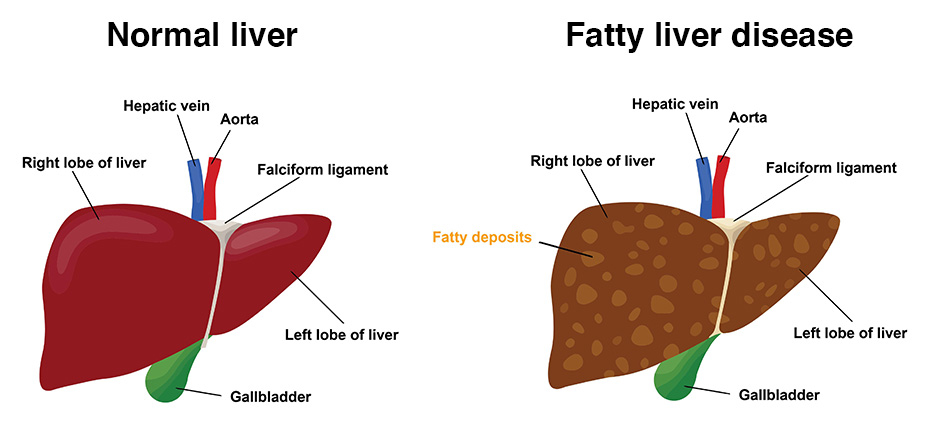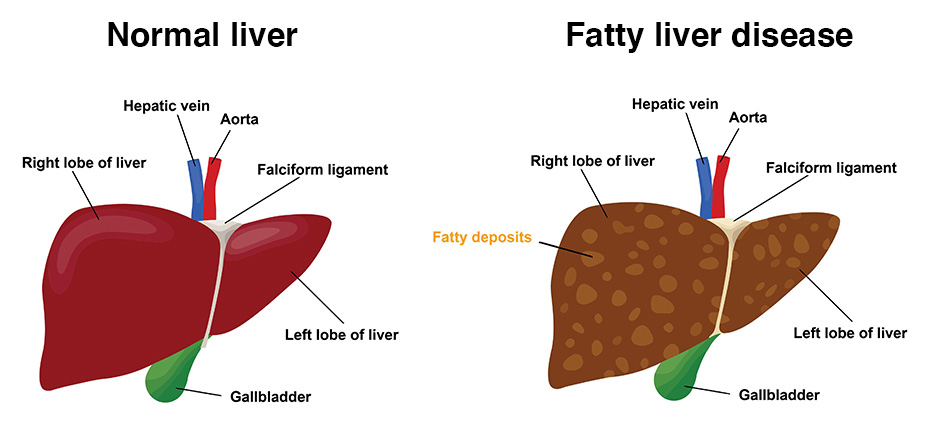What is the condition known as fatty liver disease.
Fatty liver disease occurs when an excessive amount of fat accumulates in the liver. It is quite common, especially in individuals who have diabetes and are overweight. Even if it doesn’t show any signs, it can still result in serious health issues. Adapting your lifestyle is crucial in preventing and enhancing the condition.
The liver is the primary organ responsible for processing food and waste products in the body.
A healthy liver has minimal or no fat content. When you consume excessive amounts of alcohol or food, your body processes this surplus by converting some of the calories into fat. This excess fat is then stored in liver cells.
If your liver contains more than 5% to 10% fat, it is referred to as fatty liver.
The prevalence of fatty liver is increasing as individuals consume greater amounts of added sugars and added fats. Approximately one-third of Australian adults suffer from fatty liver disease.
What are the symptoms of fatty liver disease?
Fatty liver disease usually doesn’t cause symptoms. People who have symptoms may:
- always feel tired or generally feel laziness
- abdomen discomfort can be seen to these patient feel pain in upper abdomen
- lose weight

Signs that you may have more serious fatty liver disease include:
- yellow eyes and skin (jaundice)
- bruising
- dark urine
- swollen tummy
- vomiting blood
- black stools (poos)
- itchy skin
This is the time to See your doctor if you have these symptoms.
Reasons behind fatty liver disease.
Fatty liver is typically caused by a combination of factors that accumulate over an extended period.
The primary causes of fatty liver are:
Having excess weight, particularly in the abdominal area, is a significant health concern.
Having type 2 diabetes mellitus or insulin resistance.
Having elevated levels of cholesterol or triglycerides in the blood.
Excessive alcohol consumption.
Fewer frequent causes are:
Hypothyroidism: Certain medications.
Having polycystic ovary syndrome (pcos) can be challenging, but with the right treatment, it is possible to manage the symptoms and improve overall well-being.
In certain cases, individuals can develop fatty liver as a result of complications that arise during late pregnancy.
There are two primary forms of fatty liver disease: alcoholic and non-alcoholic.
Metabolic associated fatty liver disease.
Liver damage caused by alcohol consumption.
These have different origins.
Metabolic associated fatty liver disease.
The most prevalent form of fatty liver disease is metabolic associated fatty liver disease.
This has also been referred to as: NAFLD: NAFLD: This specific type of fatty liver disease is caused by: Being overweight or obese.
Inactivity:
Liver damage caused by alcohol consumption.
Consuming excessive amounts of alcohol over an extended period can lead to the development of alcohol-related fatty liver disease.
If you engage in excessive alcohol consumption, you are at risk of developing fatty liver disease.
Consume more than 10 standard drinks per week.
Consuming more than 4 standard drinks in a single day is considered binge drinking.
What are the methods used to diagnose fatty liver disease.
Your doctor will determine if you have fatty liver by engaging in a conversation with you, followed by a physical examination.
It is possible that you may be requested to undergo a blood test known as a liver function test. This will assess the condition of your liver. You might also be asked to undergo a scan, such as an MRI or CT scan, to further evaluate your condition.
An echocardiogram.
An MRI scan.
If the tests indicate the presence of fatty liver, additional examinations may be necessary to delve deeper into your overall health condition.
Based on the outcomes of the tests, your doctor may recommend that you consult with a gastroenterologist (a specialist doctor). In extreme situations, a specialist might arrange a biopsy of your liver to definitively diagnose the condition. This will also assist them in evaluating the severity of the illness.
How is fatty liver sickness dealt with?
There aren’t any medicines to deal with fatty liver disease.
management includes making adjustments to your life-style. this could improve the condition or even reverse it.
when you have metabolic associated fatty liver disorder, you may in all likelihood be advised to:
- observe a healthful food plan and avoid sugar
- lose weight
- workout often
- manage your blood sugar
- treat excessive cholesterol if you have it
- avoid drug treatments which could affect your liver
- drink no or little or no alcohol, and end smoking
- if your fatty liver is because of alcohol, then the maximum essential component to do is give up alcohol. this can save you you from developing a more severe condition.
Your physician might also refer you to a dietitian, drug and alcohol counsellor or professional for further information.
Can fatty liver disease be prevented?
The manner to save you metabolic related fatty liver disease is to observe the same way of life recommendation given to folks that have already got the circumstance, along with:
- eating a wholesome food plan that is wealthy in fruit and vegetables, entire grains and wholesome fat
- keeping a healthy weight
- drinking no or little or no alcohol
- being physically active on maximum days of the week
- in case you haven’t been workout often, speak along with your doctor first.
headaches of fatty liver disorder
in lots of humans, fatty liver by way of itself doesn’t purpose too many problems at first.
it could get worse slowly through the years. The greater fat in the liver reasons liver irritation, which eventually ends in scarring (fibrosis) of the liver. it could also result in greater extreme persistent liver ailment, which includes cirrhosis or liver most cancers.
some those who expand extreme cirrhosis of the liver want to have a liver transplant.
human beings with fatty liver have an expanded chance of heart attack and stroke.


